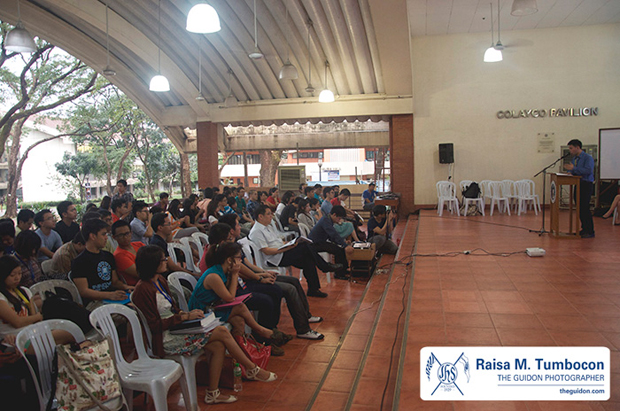THE SANGGUNIAN held its first ever State of the Sanggunian Address (SOSA) on November 19 at the Colayco Pavilion, from 4:30 PM to early in the evening.
The midyear report laid out the accomplishments of the Sanggunian these recent months and its plans for the rest of the school year.
Sanggunian President Gio Alejo and Sanggunian Finance Officer Billie Dumaliang delivered their respective speeches about the activities and transactions of the student government.
“The year started with one goal in mind and that was to make the most out of the Atenean school life,” said Alejo in his midyear report.
Alejo enumerated three strategies to achieve the goal: to build the unique yet interrelated identities of the different school boards, to strengthen the community spirit of the Loyola Schools, and to engage in nation-building initiatives and projects.
President’s report
Alejo said that the Sanggunian increased its transparency and visibility to the community in the past few months. He said that there was a more effective dissemination of information regarding the meetings they had every Friday, and that updates were also released on a regular basis.
Alejo reported that the Central Board (CB) released stands on various issues during the first semester, such as those on mining, the Reproductive Health bill and the Aurora Pacific Economic Zone and Freeport Authority issue, to name a few.
“How aware are students of these things? How can we make them act and air their own sides in these issues?” Alejo said. “This is a challenge that continues to be of primary importance as we move on to the next semester.”
The Sanggunian also took pride in having three groups institutionalized by the CB so far, namely the A-Fair Task force, the Seniors Alliance and the newly created Student Crime Prevention Council.
Alejo also mentioned plans to amend the constitution to ensure that the Sanggunian is on top of everything that happens on campus.
“This is just a midyear report. We hope we do our best to ensure that everything can be executed and done to the best of our abilities,” said Alejo.
Open forum
When asked about the specific problems he sees in the current constitution, Alejo answered that the main problem lay in the definition of roles of Sanggunian officials, particularly of the block and course representatives.
He said that the block and course representatives deserve to be more involved in policy-making because they directly interact with the student body.
Alejo also noted that the constitution says little about penal policies. “There should be a strong reward and punishment system that should be put in place to make sure you are committed to your job.”
“These are the things which I think will help Sanggu improve its quality, efficiency and its overall service to our constituents,” Alejo said.
Meanwhile, Christian Union for Socialist and Democratic Advancement Agitation and Propaganda Minister Jorel Lising asked, “What I want to know is, what do these [Sanggunian projects] mean for the students? How do you define your politics?”
Alejo admitted that not all Sanggunian projects are political. “We should strike our balance: ensuring that services are given to our students and ensuring that political awareness inside and outside school is also given top priority.”
Alejo noted that the primary difficulty lies in making students participative.
“Students are not very open when it comes to Sanggu projects of different kinds,” said Alejo. “So now, what we’re trying to do is to look at where students will be most interested in with regard to the different specializations and interests in their own school boards.”
“Not everything we do will be political because we are also in charge of providing services and basic needs for our constituents,” he said.
Alejo agreed, though, that most Sanggunian projects should be conceived politically. He said that this is something the student government would work on in the months to come.
Editor’s Note: Jorel Lising is a member of The GUIDON’s Multimedia Staff. He had no involvement in the writing of this article.







